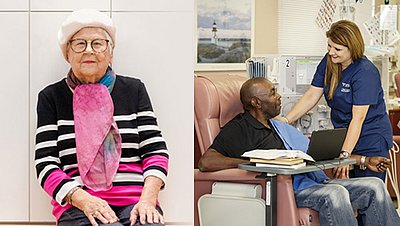Our patient stories and company features.
From Kidney Failure to Fresenius Medical Care Employee: A Transplant Story
Fresenius Medical Care employs a global workforce of nearly 120,000 people, and each employee has their own unique reason for wanting to work with the world’s leading provider of renal care. For Jasmine Defreese, a transportation clerk in New York, working for Fresenius Medical Care is personal. As a living kidney transplant recipient, Defreese knows firsthand the importance of renal care.
Crashing into Kidney Failure
At 18 years old, Defreese went to the hospital for what seemed like relatively routine care. She had a stomach virus and needed an IV fluid infusion to rehydrate. What she didn’t know was that she had underlying kidney disease, and her viral infection and subsequent dehydration had led to complete kidney failure.
“I went to the hospital to get rehydrated, and they found out my kidneys weren’t working at all,” Defreese recalls. “The next day after going in to be rehydrated, I was on dialysis.”
Many kidney patients “crash” into dialysis, meaning they were unaware of underlying kidney disease prior to needing dialysis. Globally, about 10 percent of the worldwide population is affected by chronic kidney disease, with many people unaware they have a chronic health condition. In the United States, where Defreese lives, as many as one in three adults with severe kidney disease do not know they have it. That’s one reason why regular screenings are recommended for adults to assess their kidney health.
For Defreese, by the time she discovered her underlying kidney disease, it was too late to slow the progression, and she needed life-sustaining dialysis as a teen.
The Gift of Life
After spending seven months on dialysis, Defreese’s doctors thought she might be a good candidate for transplant. Both of her parents offered to donate a kidney and began the screening process. According to Defreese, “They were both like, ‘what can I do to help you?’”
Luckily, both of Defreese’s parents tested as viable kidney donors. As her father was still working at that time, the family decided Defreese’s mother would donate her kidney. The operation was a success.
Now, 25 years later, both Jasmine and her mother are thriving with one functioning kidney each. “It’s surprising,” Defreese notes, “that having one kidney is just as good as having two kidneys.”
In that time, Defreese has seen improvements in her own treatment. She notes that immediately after her transplant, she had to take roughly 40 pills a day. Now she’s down to about 10. In addition to taking her medication as directed, Defreese maintains a kidney-healthy lifestyle and meets with her nephrologist regularly.
Publication date: April 2024



